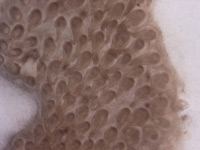
Feather Bud Development

Results/Data:
Over a period of two weeks two different cultures were prepared from the dorsal skin of eight-day chick embryos. The two different cultures gave essentially the same results in terms of success of growth and development. Initially, the presence of feather placodes was obvious along the length of the skin (figure 1). Since most of the skin was taken from the dorsum of the chicks, the pterylae (feather tracts) we see are, for the most part, from the spinal tract (figures 3 A&C). A gradation of different developmental stages of placodes/feather buds could be seen to proceed dorsolaterally outward such that feather buds directly along the spinal area are at a more advanced stage of development than those slightly more lateral (figure 3A). In addition, as the buds developed they would tend to all lean in the same direction along the skin, forming pterylae (feather tracts) (figure 4).
The development from placode stage, to short bud, to late
long bud can be seen especially well in figure
2, showing the same piece of skin at two different
stages (after 4 and 8 days in culture). We also observed
islands of blood forming among the developing feather buds
at various places along the skin (figure
3 A&B). Eventually we saw late stage feather buds,
almost approaching the feather filament stage, after
refreshing media of the first skin culture and allowing the
skin to develop for an additional week (figure
5). Development ceased after this stage. It also became
clear that some of the skin was developing abnormally. Skin
that had perhaps been placed in the culture dishes with the
dorsal side down, or twisted around, showed irregularly
shaped feather buds with irregularly shaped dermal papillae
(figure 6).
Additionally, the several limbs we placed in culture also
showed some feather bud development. Although the limb
itself (muscle, bone, etc) failed to develop any further, we
did see feather buds develop on the proximal end of the
limbs, where the skin came in contact with the culture media
(figure 7).